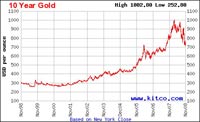INDOCHINA INTERNATIONAL CONSULTING CO., LTD
HO Add: 62L/36 Nguyên Hồng, Ward 11, Bình Thạnh District, HCMC - Vietnam
Biz Office Add: #48 Road No 11, Quarter 6, Hiệp Binh Chánh Ward, Thủ Đức, HCMC - Vietnam
®Source: http://viipip.com should be clearly quoted for any use of information extracted from our website.
Publication permit No: 60/GP-TTĐT , April 05, 2010.


The gold price performance in the last 10 years
Late last week, when the world’s gold price fell to the deepest low so far this year, the domestic dollar price unexpectedly skyrocketed. The phenomenon has been explained by the fact that with the domestic gold price higher than the world’s price (because the State Bank of Vietnam has not granted import quotas for six months), people were prompted to collect dollars for gold smuggling.
Experts have said that the unsuitable gold import and export policy, which allows gold to be imported in large quantities on some occasions, but completely halts imports at other times, has caused big losses for the national economy.
Losing $320mil?
Currently,
In the first months of the year, the inflation rate was high and the world’s gold price was at a record high, and experts said that
On the contrary, it granted big quotas to allow enterprises to import gold in big quantities. Before SBV decided to stop granting quotas, four months later, enterprises had imported 62 tonnes of gold worth $1.8bil.
Vietnam
During that time, gold prices were between $860/oz and $1,030/oz, and Vietnamese companies imported gold at $900/oz on average. The massive imports of gold were explained by the panic of people when they saw inflation skyrocketing and the financial market falling into turmoil. A lot of people spent money to purchase gold to keep in order to preserve their assets.
However, the situation is quite different now. At 9 am on November 17, the gold price was $740/oz (it was $710/oz on November 14), which means $160/oz less than the average price at which gold was imported into Vietnam.
Experts have pointed out that the panic caused the loss of $320mil on 62 tonnes of imported gold, or 2mil oz. The sum of $320mil is equal to 530,000 tonnes of 5% broken rice for export.
Import, export activities should be liberalised
Huynh Trung Khanh, a representative of the World Gold Council in
An open mechanism allows gold trading firms to easily deal with problems. When the world’s prices go down, enterprises push up imports, while when the world’s prices go up, enterprises can export gold to make profit. The liberalisation of the gold import and export policy would also help limit smuggling, while helping stabilise the foreign currency market.
The unsuitable gold import and export management has also caused difficulties for customers as well. Gold trading companies have been colluding with each other to keep gold prices at levels much higher than the world’s prices.
Khanh said that as inflation is not the biggest worry any longer and the supply and demand of foreign currencies is in balance, SBV should consider resuming granting quotas and slash the import tax from 1% currently to 0.5% and promulgate regulations on gold import and export liberalisation.
- FDI capital continues to pour into Vietnam (6/11/2025 1:20:33 PM)
- Thanh Hoa receives good news: Preparing to have an additional industrial park of up to 470 hectares, creating jobs for nearly 30,000 people (6/11/2025 1:15:09 PM)
- Industrial Park Real Estate: Waiting for the New Generation of FDI (6/11/2025 1:10:15 PM)
- A wealthy Vietnamese city will have two special economic zones after the merger (6/11/2025 1:04:42 PM)
- 30 billion USD capital FDI in Việt Nam by 2025, a series of "ông big" races to expand the land fund (6/11/2025 12:55:26 PM)
- the 2nd largest city in the North will start construction on an international economic zone (6/11/2025 12:50:20 PM)
- Japanese giant Sumitomo continues to want to build an industrial park in the countrys fourth smallest province. (6/11/2025 12:40:45 PM)
- 3 foreign corporations want to invest billions of dollars in Ba Ria - Vung Tau (6/11/2025 12:34:30 PM)
- Lotte Group member starts construction of nearly 1,000 billion VND logistics center in the province with the most industrial parks in Vietnam (6/11/2025 12:33:26 PM)
- Forming a regional center for manufacturing spare parts and components (6/11/2025 12:24:08 PM)
- Vietnams first wafer factory is about to start construction (6/11/2025 12:19:09 PM)
- Dong Nai attracts foreign investors (6/11/2025 12:13:27 PM)
- Tay Ninhs largest industrial park welcomes a $150 million high-end knitted fabric factory project (6/11/2025 12:11:00 PM)
- (6/11/2025 12:09:10 PM)
- Vietnam will become a destination for Chinese investors in the future (11/6/2023 1:03:19 PM)

- FDI capital continues to pour into Vietnam
- Thanh Hoa receives good news: Preparing to have an additional industrial park of up to 470 hectares, creating jobs for nearly 30,000 people
- Industrial Park Real Estate: Waiting for the New Generation of FDI
- A wealthy Vietnamese city will have two special economic zones after the merger
- 30 billion USD capital FDI in Việt Nam by 2025, a series of "ông big" races to expand the land fund










 ADB: Vietnam’s 2009 GDP growth to be highest in South East Asia
ADB: Vietnam’s 2009 GDP growth to be highest in South East Asia MGM Grand Ho Tram: Vietnam’s First ‘Las Vegas Style’ Integrated Resort
MGM Grand Ho Tram: Vietnam’s First ‘Las Vegas Style’ Integrated Resort Nha Trang’s Twin Towers project licenced
Nha Trang’s Twin Towers project licenced Foreign investors still have good opportunities in Vietnam
Foreign investors still have good opportunities in Vietnam Sierra Wireless gets a foot in Vietnam’s ICT market
Sierra Wireless gets a foot in Vietnam’s ICT market